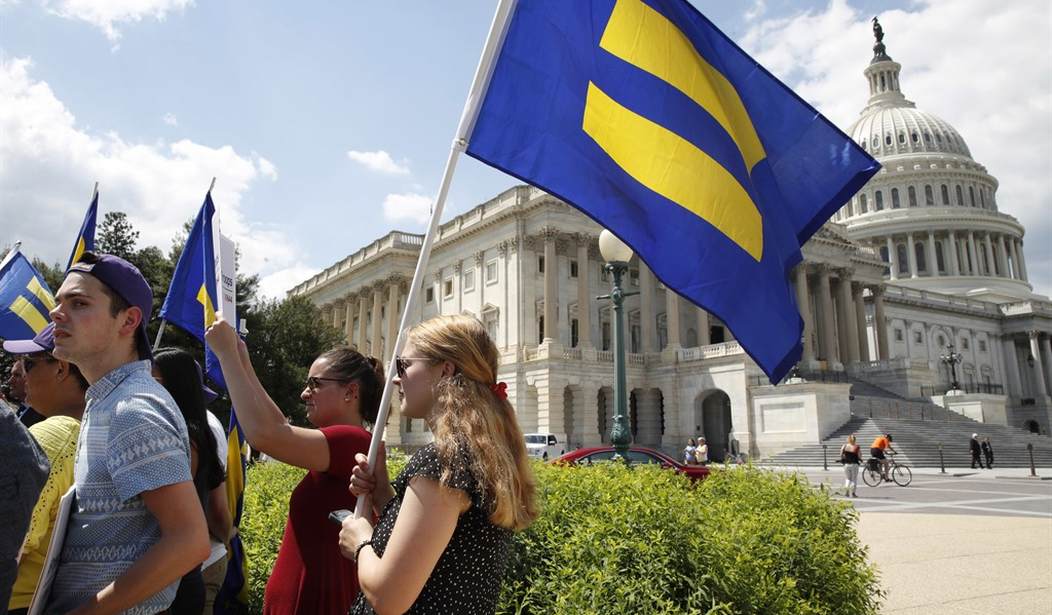A splashy poll from Reuters, but the topline number doesn’t do justice to how complicated people’s feelings are on this subject.
When asked to weigh in on the debate, 58 percent of adults agreed with the statement, “Transgender people should be allowed to serve in the military.” Twenty-seven percent said they should not while the rest answered “don’t know.”…
Among Republicans, 32 percent said transgender Americans should be allowed to serve, while 49 percent said they should not. Another 19 percent of Republicans said they don’t know.
It’s noteworthy that a third of Republicans are okay with this since Democrats are nowhere near as evenly split. On the left it’s 83/8(!), which is even more lopsided than the Democratic split on gay marriage. No doubt some religious Dems are making a distinction between marriage, which they regard as a sacred institution, and military service, which they don’t. Although there may also be a variable of national urgency in the calculus: Given all the pressure on the U.S. armed forces across the globe, Democrats (and some Republicans) may reason that if someone wants to serve, we shouldn’t be hasty in telling them they can’t. If you want an all-volunteer military, you think carefully before turning away volunteers.
How do we square the Reuters result, though, with this result from Rasmussen published just a month ago? This is what I mean about the subject being complicated.
A new Rasmussen Reports national telephone and online survey finds that just 23% of Likely U.S. Voters think the U.S. military’s decision to allow openly transgender people to serve is good for the military. Thirty-one percent (31%) believe it’s bad for the military instead, while 38% say it has no impact.
The two polls are asking two different questions. Reuters is focused on the service member’s desire to serve; Rasmussen is focused on the military’s interest in fielding a cohesive force. The two results aren’t strictly contradictory. It may be that Americans believe that having transgenders in the ranks will be somewhat bad for morale but not so terrible that it should trump a patriot’s chance to fight for his or her country. They’re willing to impose some burden on the military in the name of equal opportunity for trans citizens. In fact, according to another Rasmussen poll released yesterday, the country is evenly divided when asked if they agree with Trump’s statement that “our military must be focused on decisive and overwhelming victory and cannot be burdened with the tremendous medical costs and disruption that transgender in the military would entail.” Forty-four percent concurred, 45 percent disagreed. When the question of whether the military’s interests trump all is put squarely to Americans, they split down the middle — although no doubt some question Trump’s premise that trans soldiers necessarily cause “disruption” and “tremendous” costs to begin with.
One more recent poll for you, this time of service members and their families, not the general public. Once again, this is a complex subject:
In a Military Times/Institute for Veterans and Military Families poll conducted late last year, 57 percent of active-duty military personnel expressed a negative opinion of the decision to allowing transgender troops to serve openly. More than half of that groups said the policy change had a very negative effect on military morale.
Only about 16 percent thought the change would boost troops’ morale, while the remaining 27 percent believed the policy change would have no effect.
But the results were less clear when it came to service members’ personal expectations for the change. Almost half — 47 percent — believed the policy change would have little effect on their own unit’s military readiness.
A clear majority think letting trans people serve will hurt morale — but a plurality think it won’t matter to readiness. (Forty-one percent disagree.) That seems to jibe with the general public’s intuition in the June Rasmussen poll that trans troops will have a negative impact on the military but maybe not so much of one as to make that impact the deciding factor in judging whether a ban is justified or not. In fact, the Reuters poll shows inklings of the same conclusion. More people there thought including trans service members would make the military less capable (22 percent) than more capable (14 people), but a plurality of 43 percent thought they’d have no impact by and large. That may explain the overall result in which a solid majority support letting trans troops serve. Hurting morale is one thing, hurting readiness or capabilities is another. So long as the chief concern is the former rather than the latter, Americans will probably oppose Trump’s ban and side with letting trans people sign up.








Join the conversation as a VIP Member